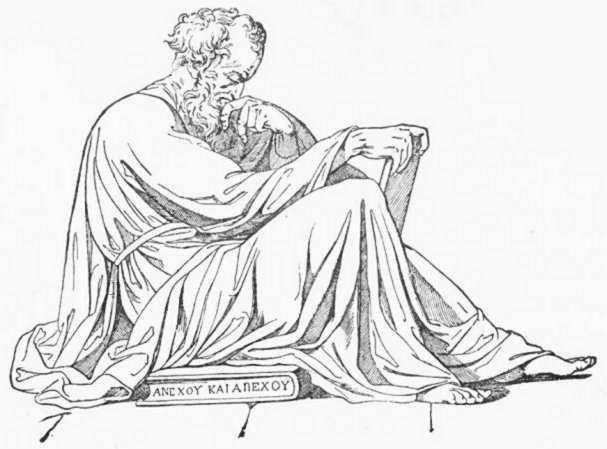
The major compilation of Epictetus’ teaching is the four-volume work (it was originally an eight-volume work, but half was lost to history) that is called Discourses. Besides Discourses, Epictetus had one more work called the Handbook or Enchiridion, which was actually a collection of his teachings that had been gathered by his student Arrian. However, Discourses can provide us with more material in order to understand late Stoic philosophy.
Epictetus believed that all humans are rational and that their mind is a reflection or part of the universal mind, which he called God or Zeus, although Epictetus didn’t think of Zeus in terms of a physical, all-powerful entity. Instead, this universal mind acts as the active principle of the universe, where all events happen under the universal logic. We could say that Epictetus thought of nature as a grand mathematical scheme in terms of the order of events. Our particular minds reflect the general logic of the grander universe, while we could say that human beings are “small universes”.
Epictetus’ Dichotomy of Control
But if everything is in order, then how is suffering possible? Well, our awareness of the world is a double-edged sword. Sometimes, we think that our power for control is greater than it actually is, and as a result, we often suffer from the disappointment we feel when this turns out to be incorrect. The basic problem that causes suffering is when we fail to distinguish what is in our control and what is not. Things within our control include our judgments, intentions, desires, and aversions – the internal world of our mind, essentially. We can’t control events that are out of our reach, such as other people, politics, nature, possessions, the inner functioning of our body, etc.
We often think that happiness is something that can be found “outside”, that we must reach it and take it, and if we fail at that attempt then negative emotions surface, such as hatred, envy, fear, anxiety, grief, and so on. Epictetus believed that we are responsible for our emotions and state of mind, and that a person has to be educated to hold their temper in difficult situations.
Changing Our Interpretations
Education is one of the most important practices in Epictetus’ view. If one is truly educated about his own mind, he will therefore not tremble in the face of situations that are outside his reach. Things that surround us are not inherently good or bad; it is only our interpretations that color those things and events. So, try to look inward and find those things that are in your power, and let go of your illusion of control over things that are external.
For example, if you are waiting in a very long queue, it is natural that you will lose patience and, consequently, become angry or anxious. In that emotional state, you can do damage to yourself and other people who are not aware of your state. You must remember that you can’t affect the line; you can’t help it move faster, but you could, for example, read something on your phone, or listen to music while you wait. Those things – how you think about it and your own actions – are in your power.
Now, consider that the long line represents your desires, and the situation represents the world. When your thoughts are not directed towards the long line, you can focus on other things. In eliminating the outside desire, you can free yourself to pursue other things in life.
“Freedom is not achieved by satisfying desire, but by eliminating it. Assure yourself of this by expending as much effort on these new ambitions as you did on those illusive goals: work day and night to attain a liberated frame of mind.”
Epictetus










